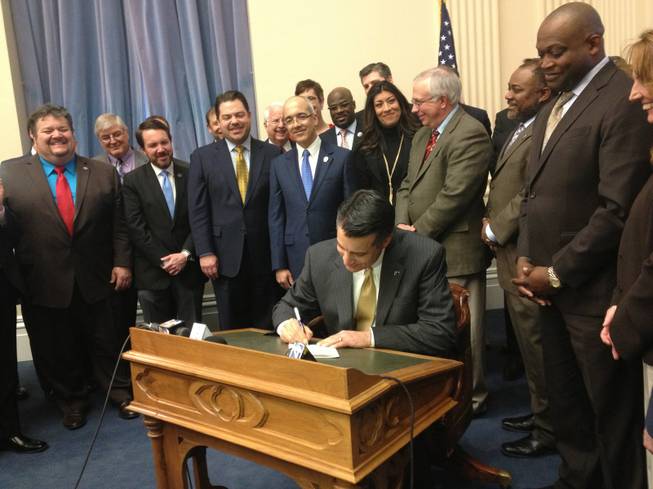
Surrounded by Nevada legislators, Gov. Brian Sandoval signs an online poker bill into law, Thursday, Feb. 21, 2013. The law will allow Nevada to move ahead with online poker in the absence of federal action.
Sunday, Feb. 24, 2013 | 2 a.m.
CARSON CITY -- Gaming walks around the Nevada Legislature like the big strutting rooster, the whale in Nevada’s political swimming pool. Because it is.
And with good reason. While other states and countries charge much higher fees on gambling and even collect more in taxes, Nevada’s casino-resort industry pays or collects 46 percent of the state’s general fund, by its own measure.
It’s a huge portion of the state’s funding, by just about anyone’s measure.
But it’s not as big as it once was. In 1997, casinos paid and collected almost 56 percent of the state’s general fund revenue.
Over the past 15 years, gaming’s share into the state’s general fund has decreased by nearly 10 percentage points, as other broader taxes have gone up.
Without a doubt, gaming has been Nevada’s economic engine and continues to be the single largest contributor to the state’s general fund. Without it, we’d be Idaho with fewer potatoes — boring.
The industry wields significant power in the Legislature, as was proven last Thursday, when the Legislature declared an online gaming bill an emergency measure. It was heard jointly by committees in the morning, passed each house of the Legislature unanimously and signed by Gov. Brian Sandoval in the afternoon.
More than a sign of bipartisanship or executive-legislative branch cooperation, though, it was a reminder that no one has juice in Nevada like big gaming, under the rubric of the Nevada Resort Association.
And the same is true over the biggest policy debate over the past decades in Carson City — money. From where does the state collect it, and is it enough to fund our schools, higher education, public safety and social services?
Gaming has argued for decades that casinos are so important to the state that efforts to tax them would be detrimental. The industry has also argued that the tax burden should be spread out among other state industries, pushing for a broad-based business tax that everyone would pay.
As a result, the gaming tax rate has only increased marginally since 1955, when Gov. Charles Russell raised it on the state’s largest casinos 2.5 points, to 5.5 percent for the largest casinos.
Almost 60 years later, the tax rate sits at 6.75 percent.
The state’s gaming tax makes up 22 percent of the state’s general fund revenue. That’s down from 42 percent in 1994, the latest budget statistics immediately available, according to a Las Vegas Sun analysis.
Meanwhile other taxes, like the sales tax, have quadrupled. The state has also added other taxes and fees, like the modified business tax, on business’ payroll.
But as many in the state push for new revenue, gaming has succeeded in keeping the target off its back.
Danny Thompson, head of the AFL-CIO, said that reliance on one industry would make those funding sources unstable.
The industry also is fighting off a higher tax bill on many fronts.
Casinos are working to exempt themselves from paying taxes on the meals they give free to employees and patrons. Caesars continues to pursue a tax exemption for the purchase of corporate jets. In the depth of the state’s budget crisis, in 2010 when the major casino companies were struggling, the NRA is opposed to paying increased fees to cover the cost of regulators.
The resort association has decided to remain neutral on the teachers' margin tax initiative, which must be passed by the Legislature in its first 40 days or go on the ballot in 2014.
“On the one hand, they say they’re out of the tax debate,” said Lynn Warne, president of the Nevada State Education Association. “With the other hand, they’re pleading their case not to pay taxes.”
Virginia Valentine, president of the Nevada Resort Association, noted that the amount the industry pays has increased, as it bears its share of the general business and sales taxes.
“There’s a difference between paying less and paying a smaller percentage,” Valentine said.
“When it comes to the state and the industry, we’re partners,” she said. “What’s good for the industry, generally, is what’s good for the state.”
The past five years have been brutal for the state. The economic recession has wreaked havoc on both the gaming industry and government services.
Gaming companies are now climbing out of the recession, but it’s unclear how much the state government will recover in the next few years.
A day after lawmakers passed the online gaming bill, lawmakers held a joint hearing about the effect of budget cuts over the past five years.
There were stories of thousands of Nevadans waiting for services. Class sizes have increased in schools and there are not enough textbooks for students. At colleges and universities, tuition has increased by over 40 percent.
No one introduced a bill, or took quick action. Without any easy solution, it was just a hearing.

Join the Discussion:
Check this out for a full explanation of our conversion to the LiveFyre commenting system and instructions on how to sign up for an account.
Full comments policy